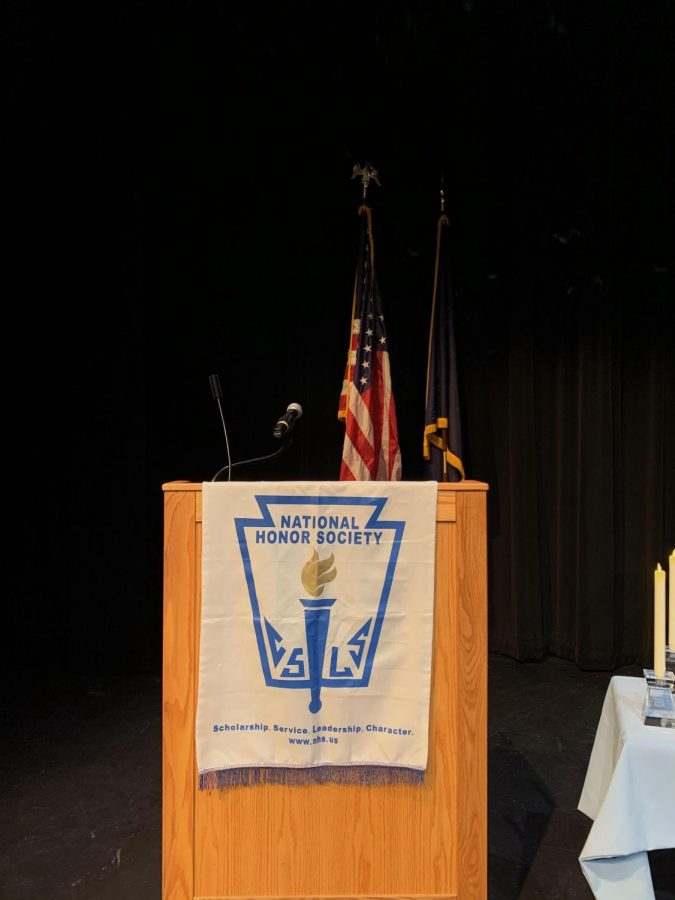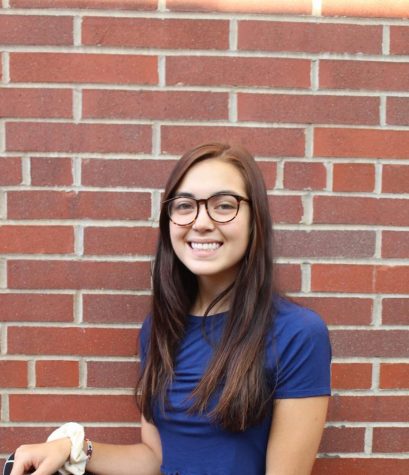Students honored at the National Honor Society induction ceremony
The podium at the NHS induction ceremony.
November 18, 2019
National Honor Society (NHS) has been present at LSE since 1956, over 50 years ago, when the school first opened. Dr. Jeff Stoehr, one of Southeast’s associate principals, said that NHS hadn’t really developed until former associate principal, Dr. Schumann, took over and grew it into what it is today.
“Dr. Schumann was the one who really took National Honor Society at Southeast and kind of grew it to what it is today, and I’ve just kind of followed those pieces,” Stoehr said.
While NHS has remained the same for many, many years, Stoehr says that the available service projects have changed a little, now including bell-ringing and tutoring as options for current LSE students. Service projects are just one of the many requirements that seniors must complete to become a member of NHS.
“[Students] have to meet certain requirements,” Stoehr said. “They have to have over 3.5 [GPA], good standing character with teachers, then they have to finish a five-hour service project in the summer, write a resume, [write] an essay, and all of that has to pass the Faculty Council.”
The Faculty Council consists of former NHS members who are now teachers at LSE. Upon reviewing your essay, resume and the hours you have completed, they decide whether or not you are allowed to continue to work for you membership as part of NHS. While this can seem overwhelming for high school students, senior Taylor Yakel says that it is not a lot of work for what you get in return.
“You get a very large return for your investment,” Yakel said.
Senior Isaac Larsen said that this was one of the many reasons that he wanted to participate in NHS. He knew that becoming a member would allow him to have a good standing with the administrators and counselors at LSE, as well as be able to show off a little to colleges and future jobs about his roles in service and leadership.
“[I knew] colleges would find [NHS] useful and impressive,” Larsen said.
Along with being able to boost your relationships with future jobs and colleges, NHS gives students something that is more academically charged to be involved in and helps distract from the typical stress of senior year, like applying for college(s).
“It gives people another avenue to focus [on] something else [other than] college,” Yakel said.
While it does provide students with a bit of a boost for their resume, it also allows students to take on roles that they find interesting for their future careers through the various committees and leadership roles. For example, senior Lily Hefner, this year’s NHS president, said that she is very interested in her future and sees herself becoming involved in law or politics for a future career, making her role as president the perfect test for the organizational and leadership skills required for being a lawyer or politician.
“I thought [being] president would be the perfect job for me,” Hefner said. “As president, I organize everyone’s jobs and responsibilities, as well as run the ceremony.”
The 2019 NHS induction ceremony took place at LSE in the Jennifer L. Dorsey-Howley Performing Arts Center on Thursday, Nov. 14. As students walked the stage, they were presented with a medallion and finally initiated into NHS. Their medallions are then worn again on graduation day when seniors walk to get their diplomas. While this ceremony has nothing to do with the work that goes into being a member of NHS, it is required to attend. According to Stoehr, it is for the students to feel the finalization of their membership.
“The purpose of the induction ceremony is [to] put a little bit of a finalized piece on the [NHS] membership students have earned,” Stoehr said. “The induction piece says ‘Okay, you are now a member of National Honor Society,’ even though they still will be doing some service after that.”
Each year, the NHS induction ceremony looks a little different, especially because the guest “keynote speaker” who comes in is unique to that ceremony. The speeches essentially look the same every year, and medallions are draped on every inductee who walks across the stage. However, it all goes back to the four cornerstones that NHS values so highly: service, leadership, scholarship and character.
“I think it’s very important to be involved in your community during high school because it builds character and unity in our community,” Hefner said. “The goal of service is to hopefully spark an interest that will keep you doing it for your entire life. I also think it is important to have that recognition and incentive to do good in your studies.”









